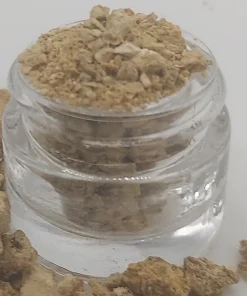WHAT is CBGA ISOLATE GOOD FOR?
CBGA Isolate – cannabigerolic acid for sale in bulk CBGA- (cannabigerol) isolate is a form of CBG that has been purified and separated from other compounds found in the cannabis plant. CBG is one of the many cannabinoids present in cannabis, and while it doesn’t produce the psychoactive effects commonly associated with THC, it has been studied for its potential therapeutic benefits.
Some potential uses and benefits of CBG isolate include:
- Anti-Inflammatory Properties: CBG has shown promise in reducing inflammation, which may be beneficial for conditions like arthritis and inflammatory bowel disease.
- Pain Relief: CBG may act as a pain reliever, and it has been studied for its potential to alleviate both acute and chronic pain.
- Neuroprotective Effects: Research suggests that CBG may have neuroprotective properties, which means it could help protect nerve cells and potentially be useful in neurodegenerative conditions like Alzheimer’s and Parkinson’s disease.
- Glaucoma Management: CBG has been explored for its potential to lower intraocular pressure, which could be beneficial in managing glaucoma.
- Antibacterial Properties: CBG has demonstrated antibacterial activity against certain strains of bacteria, making it a potential candidate for combating bacterial infections.
- Appetite Stimulation: CBG may act as an appetite stimulant, which could be helpful for individuals who have a reduced appetite due to medical conditions or treatments.
- Gastrointestinal Benefits: CBG has shown promise in reducing inflammation in the gastrointestinal tract, which could be beneficial for gastrointestinal disorders.
- Cancer Research: Some studies have indicated that CBG may inhibit the growth of cancer cells, but more research is needed in this area.
It’s essential to note that while there is scientific interest and potential for CBG isolate to be used in various medical applications, further research is necessary to fully understand its effects and potential interactions with other medications. As with any supplement or alternative treatment, it’s essential to consult with a healthcare professional before using CBG isolate, especially if you have any underlying health conditions or are taking other medications.
From CBGA To CBG: What’s The Process?
The process of converting CBGA (cannabigerolic acid) into CBG (cannabigerol) involves enzymatic reactions within the cannabis plant as it matures. CBGA is considered the precursor or “parent” cannabinoid because it serves as the starting point for the synthesis of other primary cannabinoids like THC, CBD, and CBC.
Here’s a step-by-step breakdown of the process:
- CBGA Synthesis: CBGA is produced within the cannabis plant through a series of biochemical reactions involving the combination of two precursor molecules, olivetolic acid and geranyl pyrophosphate. These reactions are catalyzed by enzymes known as CBGA synthases.
- Enzymatic Conversion: As the cannabis plant matures, specific enzymes in the plant, such as THC synthase, CBD synthase, and CBC synthase, act on CBGA and catalyze its conversion into other cannabinoids.
- THC Synthase: This enzyme converts CBGA into THCA (tetrahydrocannabinolic acid), which is the acidic form of THC, the primary psychoactive compound in cannabis.
- CBD Synthase: CBD synthase converts CBGA into CBDA (cannabidiolic acid), which is the acidic form of CBD, a non-psychoactive cannabinoid with various potential therapeutic effects.
- CBC Synthase: This enzyme converts CBGA into CBCA (cannabichromenic acid), which is the acidic form of CBC, another non-psychoactive cannabinoid that may have various health benefits.
- Decarboxylation: The acidic forms of cannabinoids (e.g., THCA, CBDA, and CBCA) are not psychoactive and must undergo decarboxylation to become THC, CBD, and CBC, respectively. Decarboxylation is a process that removes a carboxyl group from the acidic cannabinoids through heat or light exposure. This transformation results in the formation of the active and well-known cannabinoids THC, CBD, and CBC.
It’s essential to understand that the relative concentrations of these cannabinoids in a cannabis plant depend on various factors, such as the plant’s genetics, growing conditions, and cultivation techniques. For instance, strains bred for high THC content will have more THCA, which can be converted into THC when heated or exposed to light. On the other hand, strains bred for high CBD content will have more CBDA, which can be similarly converted into CBD.
When manufacturers produce CBG isolate, they intentionally harvest the cannabis plant at an early stage before significant enzymatic conversion occurs, thus capturing a higher concentration of CBGA. They then process and isolate the CBGA to create CBG isolate, which contains a higher percentage of pure CBG compared to other cannabinoids.
CBGA Benefits For The Human Body
CBGA Isolate – cannabigerolic acid for sale in bulk is considered the precursor to other major cannabinoids, and it is present in low concentrations in mature cannabis plants due to its conversion into other compounds.
While there is ongoing research into the potential benefits of CBGA, here are some potential areas where CBGA may have beneficial effects on the human body based on preliminary studies:
- Anti-Inflammatory Properties: CBGA has shown promise as an anti-inflammatory agent in some early studies. Inflammation is associated with various health conditions, and compounds with anti-inflammatory properties may have potential benefits for managing inflammation-related issues.
- Neuroprotective Effects: Some studies suggest that CBGA may exhibit neuroprotective properties, which could be relevant in conditions where protecting nerve cells from damage or degeneration is essential, such as neurodegenerative diseases.
- Gastrointestinal Benefits: CBGA’s anti-inflammatory properties may be beneficial for certain gastrointestinal conditions, though more research is needed to establish its potential effects in this area.
- Antibacterial Activity: CBGA has demonstrated antibacterial properties in research, which could be valuable in the context of combating bacterial infections.
It’s crucial to note that most of the available research on CBGA Isolate – cannabigerolic acid for sale in bulk is conducted in vitro (in lab settings) or on animal models. Human studies are limited, and much more research is required to fully understand CBGA’s potential benefits and its mechanisms of action in the human body.
Moreover, since CBGA is typically present in low concentrations in mature cannabis plants, it is less readily available for extraction and use compared to other cannabinoids like CBD and THC. As a result, CBGA-focused products are less common in the market.
As research progresses, we may gain a more comprehensive understanding of CBGA and its potential applications. However, until more human studies are conducted, it’s essential to exercise caution and consult with a healthcare professional before using CBGA or any other cannabinoid-based products for medicinal purposes.
CBDA And CBGA: What’s The Difference?
CBDA (cannabidiolic acid) and CBGA (cannabigerolic acid) are both cannabinoids found in the cannabis plant, but they serve different roles and have distinct chemical structures and properties. Here’s a breakdown of the key differences between CBDA and CBGA:
- Chemical Structure:
- CBGA: Cannabigerolic acid (CBGA) is often referred to as the “parent” cannabinoid because it is the precursor to other major cannabinoids in the cannabis plant. It is formed through a series of biochemical reactions involving the combination of olivetolic acid and geranyl pyrophosphate.
- CBDA: Cannabidiolic acid (CBDA) is a derivative of CBGA. When CBGA undergoes specific enzymatic reactions, it is converted into CBDA, which is the acidic form of CBD (cannabidiol).
- Biological Activity:
- CBGA: CBGA is considered a minor cannabinoid because it is present in low concentrations in mature cannabis plants. It does not directly interact with the endocannabinoid receptors in the human body, including CB1 and CB2 receptors.
- CBDA: CBDA is also considered a minor cannabinoid, and like CBGA, it does not directly interact with the endocannabinoid receptors. Instead, CBDA is believed to exert its effects through other mechanisms, including interactions with serotonin receptors (5-HT1A receptors) and the endocannabinoid system.
- Potential Effects:
- CBGA: As CBGA Isolate – cannabigerolic acid for sale in bulk is the precursor to other cannabinoids, it is not typically associated with specific effects on its own. Instead, it serves as the starting point for the synthesis of THCA, CBDA, CBCA, and other acidic cannabinoids in the cannabis plant.
- CBDA: While research on CBDA is still in its early stages, some studies have suggested potential health benefits for CBDA, including anti-inflammatory, anti-nausea, and anti-anxiety effects. CBDA may also have potential in managing conditions like arthritis and certain forms of epilepsy, but more research is needed to establish its therapeutic potential.
- Decarboxylation:
- CBGA: CBGA, as the precursor to other cannabinoids, can be converted into other cannabinoids through enzymatic reactions, including THCA, CBDA, and CBCA. Decarboxylation (removal of a carboxyl group) of these acidic cannabinoids yields the active forms, such as THC, CBD, and CBC.
- CBDA: Like other acidic cannabinoids, CBDA needs to undergo decarboxylation to become CBD, the non-acidic, active form. This process typically occurs through heat application, such as smoking or vaporizing the plant material or heating CBDA-rich extracts.
In summary, CBGA is the “parent” cannabinoid that acts as a precursor to other cannabinoids, including CBDA. CBGA does not have well-defined effects on its own, while CBDA is associated with some potential therapeutic properties, although research is ongoing to better understand its full range of benefits and mechanisms of action.
CBGA Effects: How Does It Feel?
Since CBGA is typically present in low concentrations in mature cannabis plants and serves as a precursor to other cannabinoids, it is not typically consumed or isolated for its effects. Instead, it is of more interest to researchers studying the biosynthesis of cannabinoids in the cannabis plant.
As a precursor, CBGA is enzymatically converted into other cannabinoids like THCA (tetrahydrocannabinolic acid), CBDA (cannabidiolic acid), and CBCA (cannabichromenic acid). These acidic forms of cannabinoids are not psychoactive and must undergo decarboxylation (removal of a carboxyl group) to become the active and well-known cannabinoids THC, CBD, and CBC, respectively.
Since CBGA itself does not directly interact with the endocannabinoid receptors in the human body, it is unlikely to produce the typical “feelings” or psychoactive effects associated with cannabinoids like THC. Instead, it plays a crucial role in the biosynthesis of other cannabinoids and may contribute to the overall cannabinoid profile of a cannabis plant.
As research on CBGA and its effects continues, we may gain a better understanding of its potential benefits and interactions within the endocannabinoid system. However, for now, it is essential to rely on well-established cannabinoids like THC and CBD for their known effects, and exercise caution when using any cannabinoid-based products, especially those with limited research data.
CBGA Products

